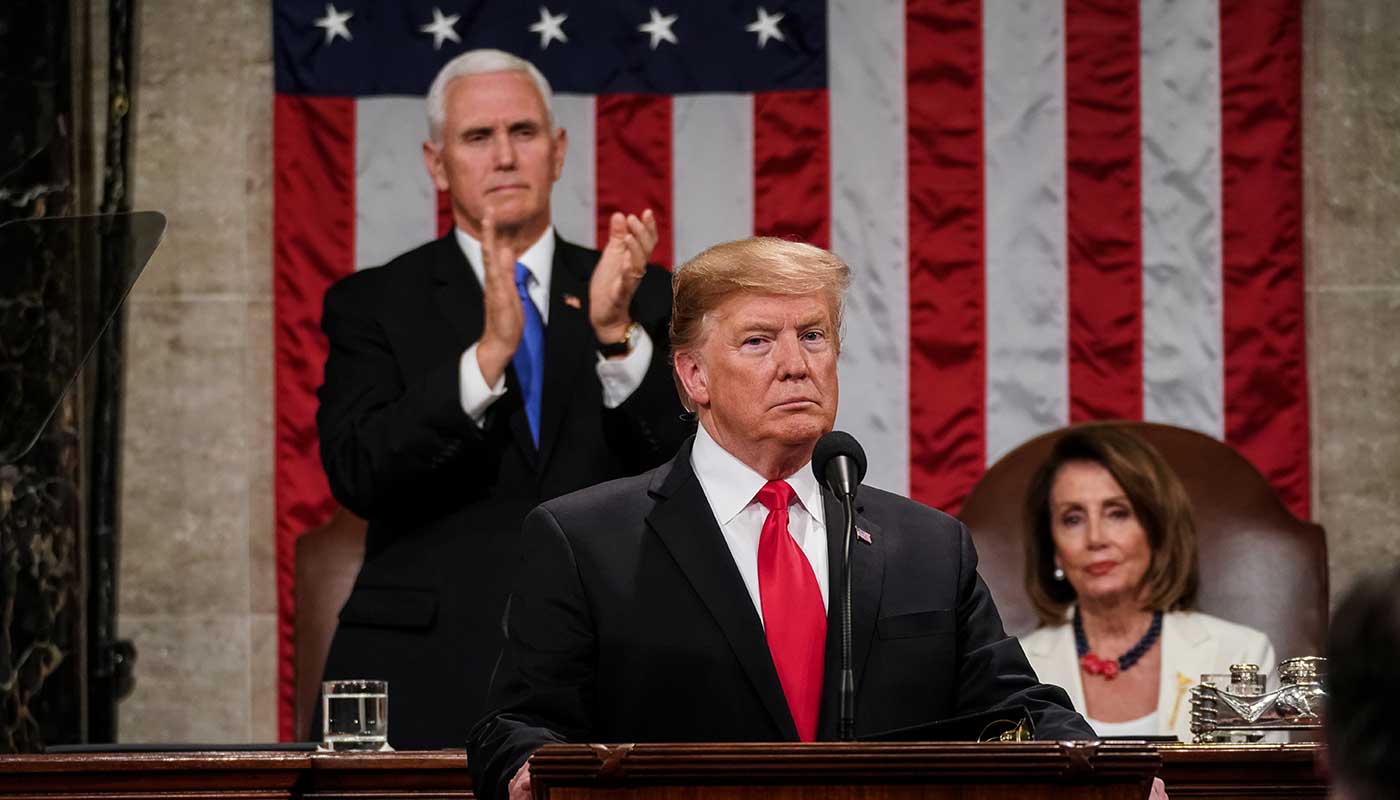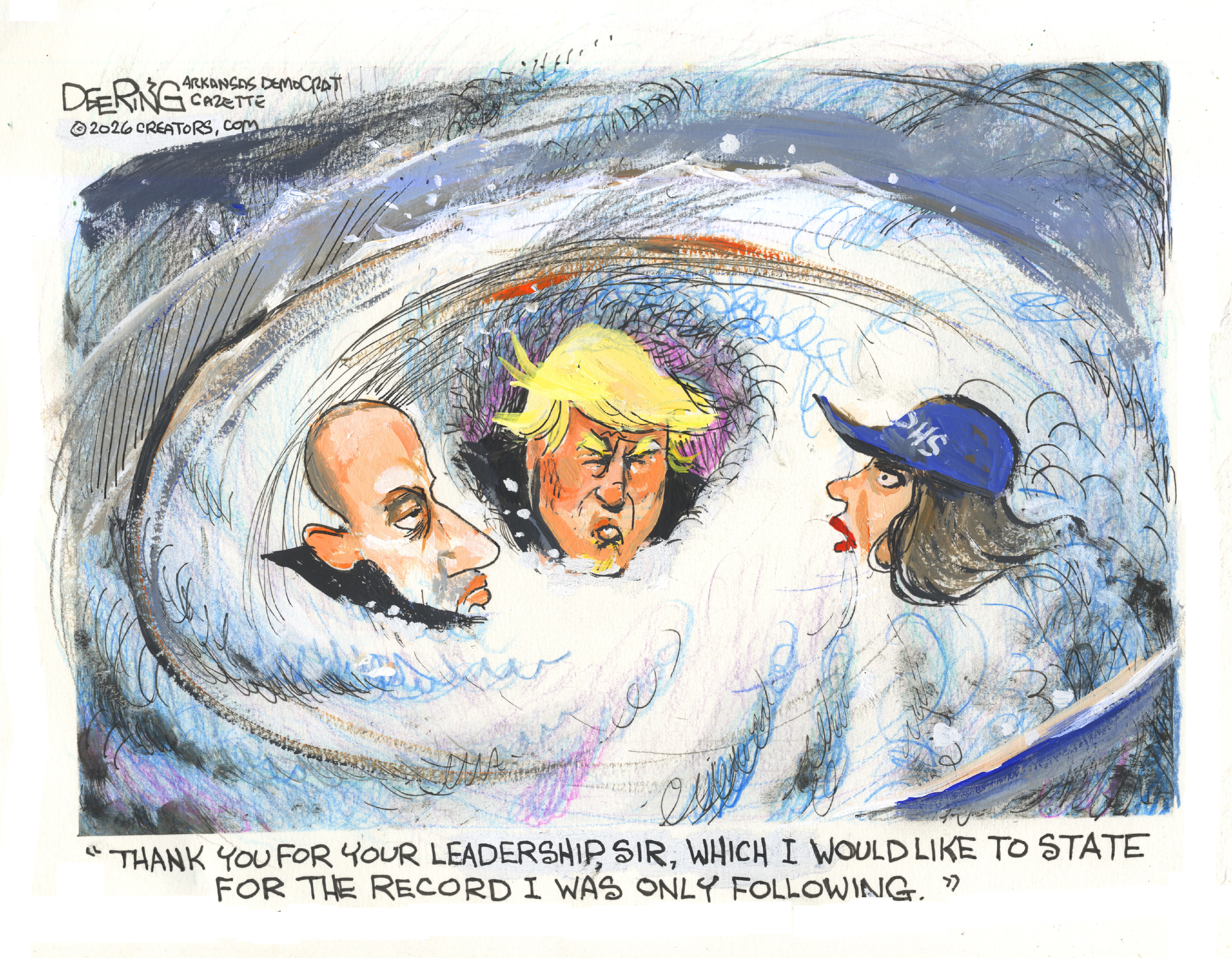Eight key talking points from Donald Trump’s State of the Union address
Illegal immigration, national security and pleas for bipartisanship dominate the delayed speech

A free daily email with the biggest news stories of the day – and the best features from TheWeek.com
You are now subscribed
Your newsletter sign-up was successful
Donald Trump has delivered his second State of the Union address, speaking on a wide range of topics before a joint sitting of Congress for nearly 90 minutes.
The US president used the speech to call for an end to political discord on a number of issues, blaming “ridiculous partisan investigations” for destabilising US politics.
However, reaction to different elements of Trump’s speech were clearly divided along party lines, with the BBC noting that Democrats “sat stony-faced as their Republican counterparts rose to their feet for the applause lines”.
The Week
Escape your echo chamber. Get the facts behind the news, plus analysis from multiple perspectives.

Sign up for The Week's Free Newsletters
From our morning news briefing to a weekly Good News Newsletter, get the best of The Week delivered directly to your inbox.
From our morning news briefing to a weekly Good News Newsletter, get the best of The Week delivered directly to your inbox.
Here are the key talking points of Trump’s State of the Union address.
Border security and immigration
Unsurprisingly, border security was a major focus of Trump’s address, as he once again called for bipartisan support for a physical barrier at the US-Mexico border.
“My administration has sent to congress a common-sense proposal to end the crisis on the southern border,” Trump said.
A free daily email with the biggest news stories of the day – and the best features from TheWeek.com
“It includes humanitarian assistance, more law enforcement, drug detection at our ports, closing loopholes that enable child smuggling, and plans for a new physical barrier or wall to secure the vast areas between our ports of entry,” he continued.
The border wall is one of the most contentious issues the Trump administration currently faces, with the prospect of another government shutdown looming as lawmakers struggle to come up with a workable solution.
Trump went off script while talking about immigration policy, saying: “I want people to come into our country, in the largest numbers ever, but they have to come in legally.”
The ad-libbed section – “in the largest numbers ever” – was not in the official transcript of the speech, and is contradictory to his stated policy on the issue.
Foreign conflicts
Trump spoke once again about his desire to bring American troops home from overseas conflicts, adding that Islamic State had been all but wiped out in recent years.
“It is time to give our brave warriors in Syria a warm welcome home,” Trump said, noting the US would continue to work to “destroy the remnants of Isis”.
Trump also signalled that the US is actively seeking a political solution to the ongoing conflict in Afghanistan, including negotiations with the Taliban.
“Our troops have fought with unmatched valour – and thanks to their bravery, we are now able to pursue a political solution to this long and bloody conflict,” Trump said.
Trump also noted that the US has spent more than $7 trillion fighting in the Middle East, and vowed to bring US troops home quickly.
The US economy
Trump talked up the strength of the US economy, pointing out that since he was elected, the US has created more than six million new jobs, 300,000 in January alone.
He went on to claim that he had launched an “unprecedented economic boom”, however NBC News says that most economists would agree that the growth Trump is taking credit for “has been built upon the upward trajectory that began under Obama”.
Healthcare and drugs
A hot-button issue throughout the United States, Trump called for bipartisan support for measures that would force transparency on healthcare, drug prices and insurance prices.
“We must do more. It’s unacceptable that Americans pay vastly more than people in other countries for the exact same drugs, often made in the exact same place,” Trump said. “This is wrong, this is unfair and together we will stop it and we’ll stop it fast.”
Trump also called for bipartisan efforts to end the transmission of HIV in the US by 2030, asking Congress for more funding for Aids prevention and treatment.
Family leave and late-term abortions
Trump became the first US president to propose a federal policy to introduce paid family leave for new parents, “so that every new parent has the chance to bond with their newborn child”.
The announcement drew a strong positive response from both sides of the aisle, including Mississippi Republican Ann Wagner, who shouted “yes!” after the announcement.
Trump then pivoted to announce he would be seeking a federal ban on late-term abortions, which brought the Republican side of the chamber to its feet amid loud, sustained applause.
In one of his more boastful passages, Trump claimed that the US would be engaged in military conflict, if not for his presidency.
“If I had not been elected president of the United States, we would right now, in my opinion, be in a major war with North Korea,” Trump said, eliciting a chorus of groans from the Democrat side of the chamber.
Trump then announced that he would be meeting with North Korean leader Kim Jong Un in Vietnam on 27 and 28 February.
Special guests
Trump took time throughout his address to single out a number of special guests he had invited to attend the State of the Union.
Those guests included 10-year-old Grace Eline, who is a recent survivor of brain cancer, whom Trump used to illustrate the need for better funding for childhood cancer research.
Other guests included Judah Samet, who survived both the Holocaust and a deadly shooting at the Tree of Life Synagogue in Pittsburgh late last year. When Trump pointed out it was Samet’s 81st birthday, lawmakers broke out in a spontaneous rendition of Happy Birthday.
The Swat officer credited with ending the Pittsburgh shooting, Timothy Matsin, was also present for the address. Matsin was shot seven times while trying to stop the shooter.
Wrapping up
Trump ended his speech on a positive note, saying: “We must keep America first in our hearts. We must keep freedom alive in our souls. And we must always keep faith in America’s destiny - that one Nation, under God, must be the hope and the promise and the light and the glory among all the nations of the world.”
-
 6 gorgeous homes in warm climes
6 gorgeous homes in warm climesFeature Featuring a Spanish Revival in Tucson and Richard Neutra-designed modernist home in Los Angeles
-
 Russia’s ‘cyborg’ spy pigeons
Russia’s ‘cyborg’ spy pigeonsUnder the Radar Moscow neurotech company with Kremlin-linked funding claims to implant neural chips in birds’ brains to control their flight, and create ‘bio-drones’
-
 Political cartoons for February 8
Political cartoons for February 8Cartoons Sunday’s political cartoons include going down the drain, American history, and more
-
 Trump links funding to name on Penn Station
Trump links funding to name on Penn StationSpeed Read Trump “can restart the funding with a snap of his fingers,” a Schumer insider said
-
 Trump reclassifies 50,000 federal jobs to ease firings
Trump reclassifies 50,000 federal jobs to ease firingsSpeed Read The rule strips longstanding job protections from federal workers
-
 Is the Gaza peace plan destined to fail?
Is the Gaza peace plan destined to fail?Today’s Big Question Since the ceasefire agreement in October, the situation in Gaza is still ‘precarious’, with the path to peace facing ‘many obstacles’
-
 Vietnam’s ‘balancing act’ with the US, China and Europe
Vietnam’s ‘balancing act’ with the US, China and EuropeIn the Spotlight Despite decades of ‘steadily improving relations’, Hanoi is still ‘deeply suspicious’ of the US as it tries to ‘diversify’ its options
-
 Trump demands $1B from Harvard, deepening feud
Trump demands $1B from Harvard, deepening feudSpeed Read Trump has continually gone after the university during his second term
-
 Trump’s Kennedy Center closure plan draws ire
Trump’s Kennedy Center closure plan draws ireSpeed Read Trump said he will close the center for two years for ‘renovations’
-
 Trump's ‘weaponization czar’ demoted at DOJ
Trump's ‘weaponization czar’ demoted at DOJSpeed Read Ed Martin lost his title as assistant attorney general
-
 Gabbard faces questions on vote raid, secret complaint
Gabbard faces questions on vote raid, secret complaintSpeed Read This comes as Trump has pushed Republicans to ‘take over’ voting